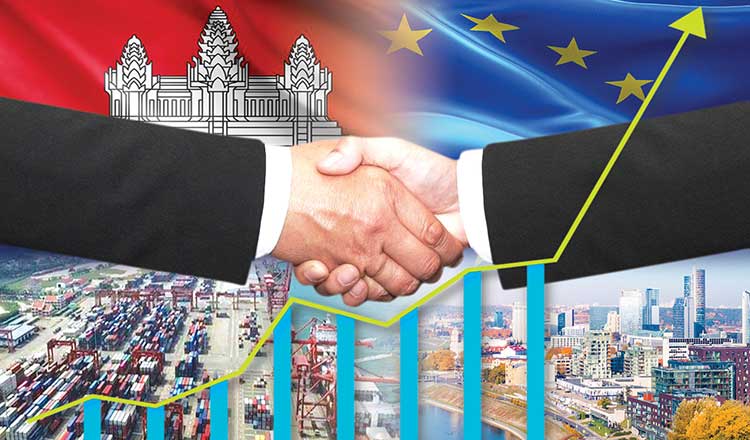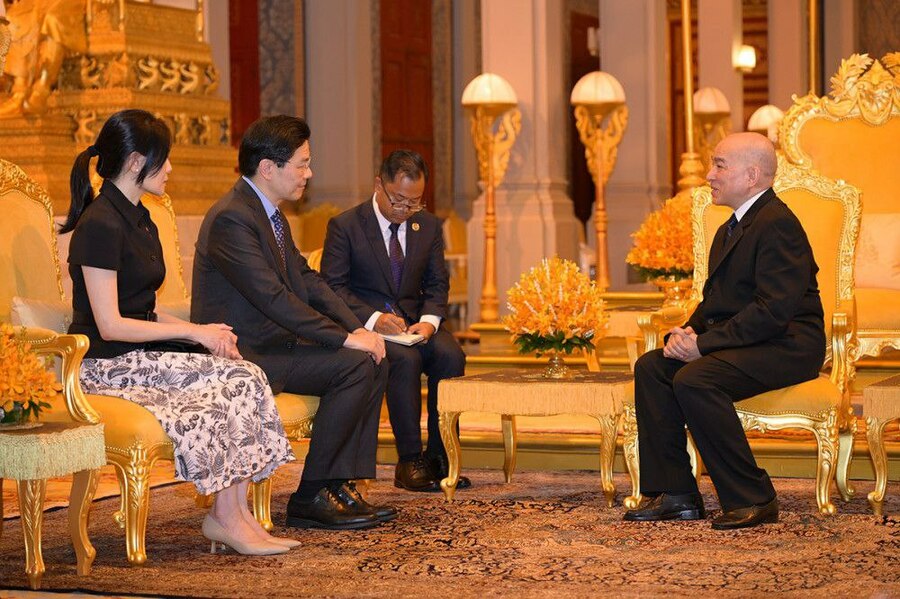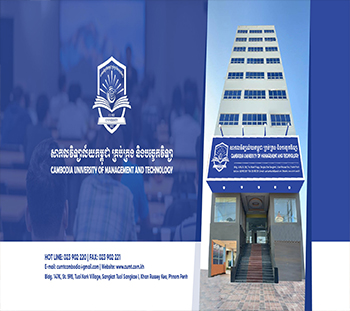
GROWING PARTNERSHIP: EU committed to supporting Cambodia’s development


The European Union (EU) is committed to supporting Cambodia’s economic development and aims to elevate their growing trade relationship, EU Ambassador to Cambodia Igor Driesmans stated during an interview with Khmer Times.
The EU is Cambodia’s fourth-largest trading partner and both enjoy a growing trade relationship
In 2023, the EU and Cambodia traded a total of €5.8 billion ($6.25 billion) in goods. Cambodia exported €5.5 billion ($5.93 billion) worth of goods to the EU in 2022, which was a 25% increase from 2021. Cambodia’s main exports to the EU are textiles, footwear, bicycles, foodstuffs, and vegetable products. The EU is also the largest buyer of Cambodia’s milled rice.
Such status quo is a great jumpstart for Ambassador Driesmans, who underscored that deepening the economic links and investment between Cambodia and EU members has been one of his main goals since his arrival in the Kingdom over a year ago.
“Cambodia enjoys duty-free quota and free access to our market, which has led to a huge job creation here in the country,” he said in an episode of Cross-Talk broadcasted on Friday last week.
“That has fundamentally boosted and helped the Cambodian growth over the last 10 years. If you look here at the garment, footwear, and travel goods factories, we’re talking about 700,000 people who are employed in those sectors, and it’s been a real engine for Cambodian growth, and it still is today.”
Cambodia has benefitted from the EU’s Everything But Arms (EBA) scheme since 2004, which grants duty-free and quota-free access for all exports, except arms and ammunition. However, in 2020, the EU withdrew about 20% of the EBA scheme.
In the interview on October 11, Ambaasador Driesmans gave an explanation on this setback.
“A few years ago, we withdrew part of the trade preferences under the ‘Everything But Arms’ scheme due to what we considered violations of human rights and democracy,” he explained.
“These preferences are given unilaterally to least developed countries, allowing them duty-free, quota-free access to our market to promote their growth. However, our taxpayers and Parliament expect that if we offer these benefits, the beneficiary countries should at least respect basic international conventions on labour standards, human rights, and so forth.”

Ambaasador Driesmans nonetheless stated that Cambodia still keeps a vast majority of the preferences, which it will be entitled to lose no matter what when it becomes an upper middle-income country, hopefully by 2029.
“This is obviously very good news for Cambodia, as it signifies that the country is becoming wealthier and is recognised as such by the international community as reflected by the United Nations,” he said. “However, the challenge will be that many countries, including the European Union, will adjust their trade preferences. These preferences are typically granted to poorer countries, not those that have grown wealthier. Consequently, the European Union will automatically revise its trade preferences.”
“This means that Cambodia will need to move up the value chain by developing industries that add more value locally, rather than exporting raw materials, in order to address the challenges that come with losing some of these trade preferences as a result of becoming a middle-income country.”
Ambassador Driesmans added that one of the objectives of the Cambodian government has been to attract more investment from European companies, and currently, there is a foreign direct investment (FDI) stock of around one billion dollars, but the goal remains to bring in more investments.
“His Excellency Sun Chanthol has travelled to Europe to promote Cambodia as an investment destination, and he will be going again next month, this time to France and likely the Czech Republic. The aim is to further promote Cambodia, and this presents an opportunity to discuss strategies for attracting more European investment,” he said.
The EU Ambassador claimed that Cambodia has qualities that make it stand out as an investment destination in Southeast Asia, such as very liberal laws and a young working population. He also praised the European Chamber of Commerce in Cambodia (EuroCham Cambodia) for its key roles in attracting European investors to Cambodia.
“They are a fantastic resource and partner for us because every year they produce a white book that outlines, in detail, what could be improved to attract more investment and promote further growth in Cambodia,” he said. “This is extremely helpful for us, as it allows us to relay these recommendations to the government and other relevant stakeholders.”
The Cambodian government still has to increase improvement in some areas to improve the Kingdom’s ranking as an investment destination for European businesses, Ambassador Driesmans added.
“There are also a few areas where Cambodia could improve to attract more European investment. These include taxation laws, broader governance issues, and the availability of skilled labour,” he said. “In all of these areas, we are here to partner with Cambodia to help address these challenges.”






